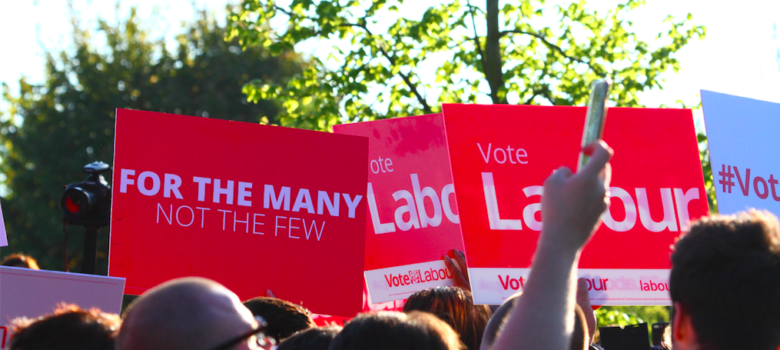
We’ve had a look through Labour’s new manifesto and dug out their environmental policies to see whether or not they are offering a viable alternative to the current government’s lack of commitment in this area. You can also see our thoughts on the Conservatives’ policies.
The document sets out 3 key focuses:
- ‘To ensure security of energy supply and keep the lights on.’
- ‘To ensure energy costs are affordable for consumers and businesses.’
- ‘To ensure we meet our climate change targets and transition to a low-carbon economy.’
Energy policy
Labour’s manifesto says what the UK’s energy mix needs and the current government hasn’t delivered is modernisation and non-polluting alternatives. However, Labour’s policies in regards to energy generation seem pretty muddled. It does acknowledge that energy blackouts are now a very real threat, as successive governments have been burying their heads in the sand with regards to the UK’s waning capacity for energy generation.
However, despite stating its commitment to ‘keep the lights on’ in its first few sentences, the manifesto doesn’t specify how it will boost energy generation. It talks about the positives of a low-carbon energy sector and mentions banning fracking to diversify away from fossil fuels – but it doesn’t rule out the use of oil or gas. In fact, it actually talks about ‘protecting North Sea assets’.
One thing Labour and Conservatives agree on is the investing in tidal lagoons, like the one currently planned for Swansea. Their enthusiasm for this technology might well hinge on the technology’s promise as a huge economic export for the UK.
Disappointingly, the document completely fails to mention wind or solar at all. This is surprising considering the proven potential of the UK’s renewable sources.
The one thing that is clear is that the manifesto is wholly in favour of nuclear energy; it proudly states that the ‘UK has the world’s oldest nuclear industry’ and vows to support future nuclear projects.
Fuel poverty
The manifesto points to the fact that customers are being overcharged on their energy bills, leading to higher numbers than ever before suffering from fuel poverty. Labour also states its intention to insulate 4 million homes to fight fuel poverty and help prevent the health problems and winter deaths associated with it. Like Theresa May, Labour proposes introducing an energy fuel cap, limiting the amount suppliers can charge for gas and electricity. This is intended to curb the increasing profits of the big six energy companies, while ensuring that energy is affordable for everyone. One drastic way Labour’s energy policy would differ to that of the Conservatives is its proposed renationalisation of the energy companies.
Air pollution
The manifesto is predictably damning in in regards to the actions – and inactions – of the current Conservative government. It highlights how ministers ‘evaded their responsibilities on air quality, [and] allowed fracking in national parks.’ The manifesto sets out the intension to establish an environmental tribunal to hear challenges to unlawful government decisions like those made on the Conservatives’ air quality strategy.
One thing foregrounded in the manifesto is Labour’s commitment to tackling the UK’s air pollution crisis. It states in no uncertain terms that ‘our air is killing us’. Its own Sadiq Khan’s has introduced several measures to combat air pollution during his first few months as Mayor of London, and – in theory – most of these could be brought into place nationwide.
Other green policies
Labour’s broader green policies focus on sustainable farming and fishing, safeguarding marine life and protecting the UK’s forests. It states its intention to ‘plant a million trees of native species to promote biodiversity and better flood management.’ Labour also promises to safeguard ocean species and cut food manufacturing waste. It mentions researching carbon capture and storage, but doesn’t go into any detail.
What do people think of Labour’s environmental policies?
There has been a pretty mixed reception to this section of the manifesto – and it’s easy to see why. It comes across as a lot of half-baked ideas, mentioned but not expanded on. It certainly doesn’t go far enough to offer radical change to those for whom green issues are important. In fact, it’s quite surprising that the Green Party were so keen to claim a lot of the ideas as their own.
There are some good suggestions for combating fuel poverty, and on a lot of emphasis on environmental issues concerning animals and Britain’s green spaces. The subjects of cutting carbon, boosting energy generation and moving to renewables should arguably have got much more attention than they did.
The manifesto has some good ideas, but it is also full of contradictions. As Jonathan Bartley succinctly put it, ‘You can’t pour money into Hinkley [nuclear power plant] and create a renewable energy revolution.’ The Labour manifesto doesn’t offer anything like an energy revolution – but it does have some awareness of the key areas that need improvement. We wait to see how the Conservatives’ offer will compare.
Think we missed something? Do you have a different opinion?
Comment below to get your voice heard…












One Comment